| Srl | Item |
| 1 |
ID:
075300
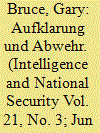

|
|
|
|
|
| Publication |
2006.
|
| Summary/Abstract |
The following article traces the development of East Germany's secret police, the Stasi, during the reign of Ernst Wollweber, the second Minister of State Security. By examining key Stasi operations during this period, notably the 'concentrated strikes' strategy following the June 1953 revolution, the campaign against Ostbüros, and operations to secure the economy, and by examining Wollweber's major speeches, it argues that Wollweber's reign was a decisive one for the Stasi because of the integration of intelligence gathering outside of East Germany (Aufklärung) with domestic surveillance (Abwehr). Although this balance shifted toward external duties in Wollweber's landmark August 1955 speech, Wollweber continued to promote integration of the two duties, in particular by anchoring the intelligence gathering duties in the local-level domestic structures of the Stasi.
|
|
|
|
|
|
|
|
|
|
|
|
|
|
|
|
| 2 |
ID:
038626
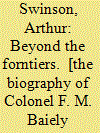

|
|
|
|
|
| Publication |
London, Hutchinson, 1971.
|
| Description |
xiii, 246p.Hbk
|
| Standard Number |
0091058708
|
|
|
|
|
|
|
|
|
|
|
|
Copies: C:1/I:0,R:0,Q:0
Circulation
| Accession# | Call# | Current Location | Status | Policy | Location |
| 007888 | 923.5941/SWI 007888 | Main | On Shelf | General | |
|
|
|
|
| 3 |
ID:
169514
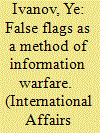

|
|
|
|
|
| Summary/Abstract |
TODAY'S international political competition is largely about states and political groups trying to undermine one another's prestige, and they far from always use peaceful means in doing so. The arsenals that are used in such struggles include false flags - attacks, sometimes causing heavy casualties, that are falsely blamed on their adversariesby those who carry them out.
|
|
|
|
|
|
|
|
|
|
|
|
|
|
|
|
| 4 |
ID:
131383
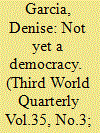

|
|
|
|
|
| Publication |
2014.
|
| Summary/Abstract |
Brazil is considered one of the more successful examples of democratic transition and consolidation in the developing world; and one of the fastest developing and emerging countries. This article contends that Brazil is not yet a fully established democracy, because it lacks the proper civilian checks and balances ensuring full authority over the armed forces, police and secret services. There are five main reasons for this: first, the Constitution does not provide a generalised guide for the institution of civilian oversight. Second, a change of cultural perceptions vis-à-vis the security sector entities is needed. Third, piecemeal rather than holistic or comprehensive legal and institutional transformation has occurred, with little civilian oversight of the armed forces. Fourth, the large structures still held by each of the armed forces require re-articulation and fundamental transformation. Finally, there is no fully fledged civil society participation in security sector life through the media and academia. These problems weaken democracy in Brazil. The course of democratisation in Brazil and the role the security sector played in the transition are examined before discussion of some of the more recent legal and political developments in the security sector, as part of the democratic consolidation. The conclusion presents insights from Brazil's experience and lessons for states facing similar transition challenges.
|
|
|
|
|
|
|
|
|
|
|
|
|
|
|
|
| 5 |
ID:
117105
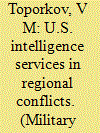

|
|
|